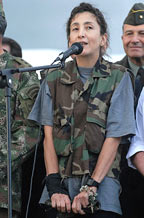
Ingrid Betancourt, a politically militant Franco-Columbian, held hostage by the
Revolutionary Armed Forces of Columbia (FARC), was liberated on Wednesday, July
2, 2008, after 6½ years in captivity.
In 2001, this exceptional woman wrote an account of her life and her battle
against corruption and the drug cartels in Columbia in a book entitled “La rage
au coeur”, later published in English as “Until Death Do Us Part: My Struggle to
Reclaim Columbia”.
She is an inspiring example of the heroic force that enables an individual to
place values such as justice at the centre of one’s existence. By her constant
militancy and unwavering courage, she succeeded in displaying to her people (as
an elected member of the Chamber of Deputies in 1989 and as a senator in 1994) a
real hope for change exposing herself to reprisals of the governing political
class. Fearing the threats on the lives of her two children, she sent them to
live with their father in New Zealand.
Soon after she was freed from the Columbian jungle and the grip her kidnappers,
Ms. Betancourt announced her intent to return to Columbia to continue the
battle. In this she is a vibrant example of a valiant individual with the type
of courage that Plato defined as a heart that follows without wavering, through
pain and pleasure, the mandates of justice “knowing what not to fear.”
For Plato, there exists an anger of the just, a fervour, an angry heart that
animates a good man witnessing injustice. What individual does not feel anger in
the face of brutal injustice? This kind of constructive anger, found in several
great moments of history, is what Plato called courage.